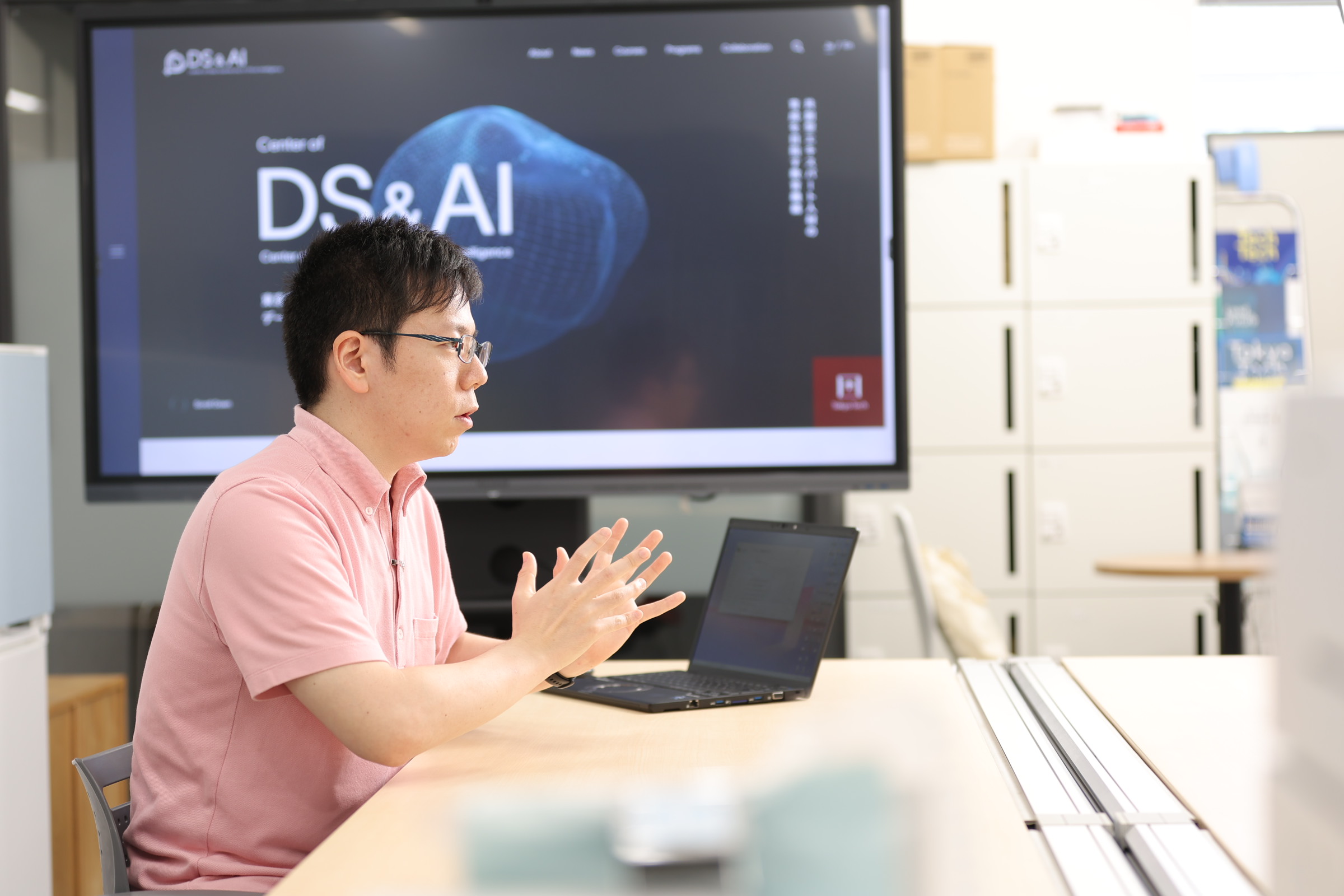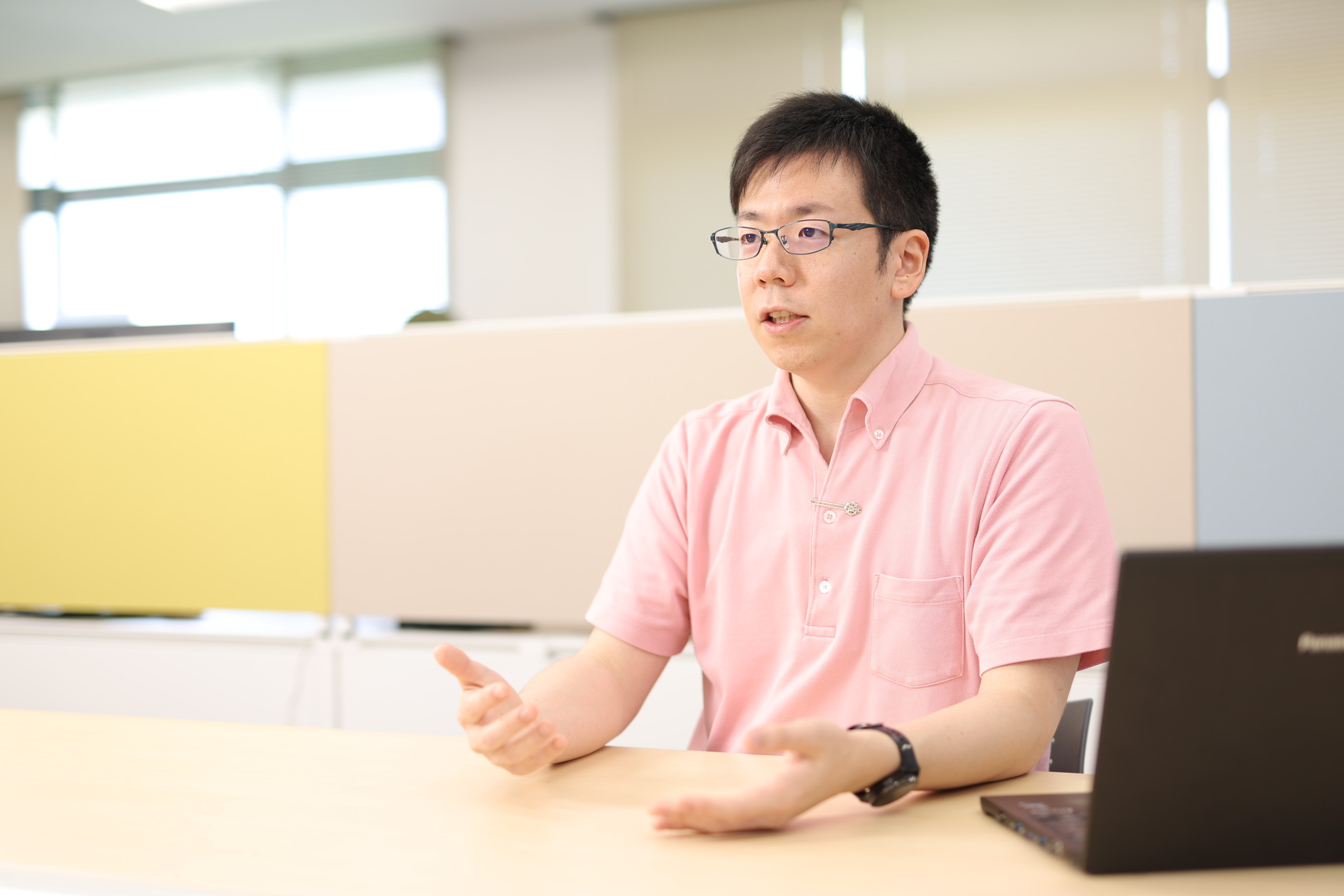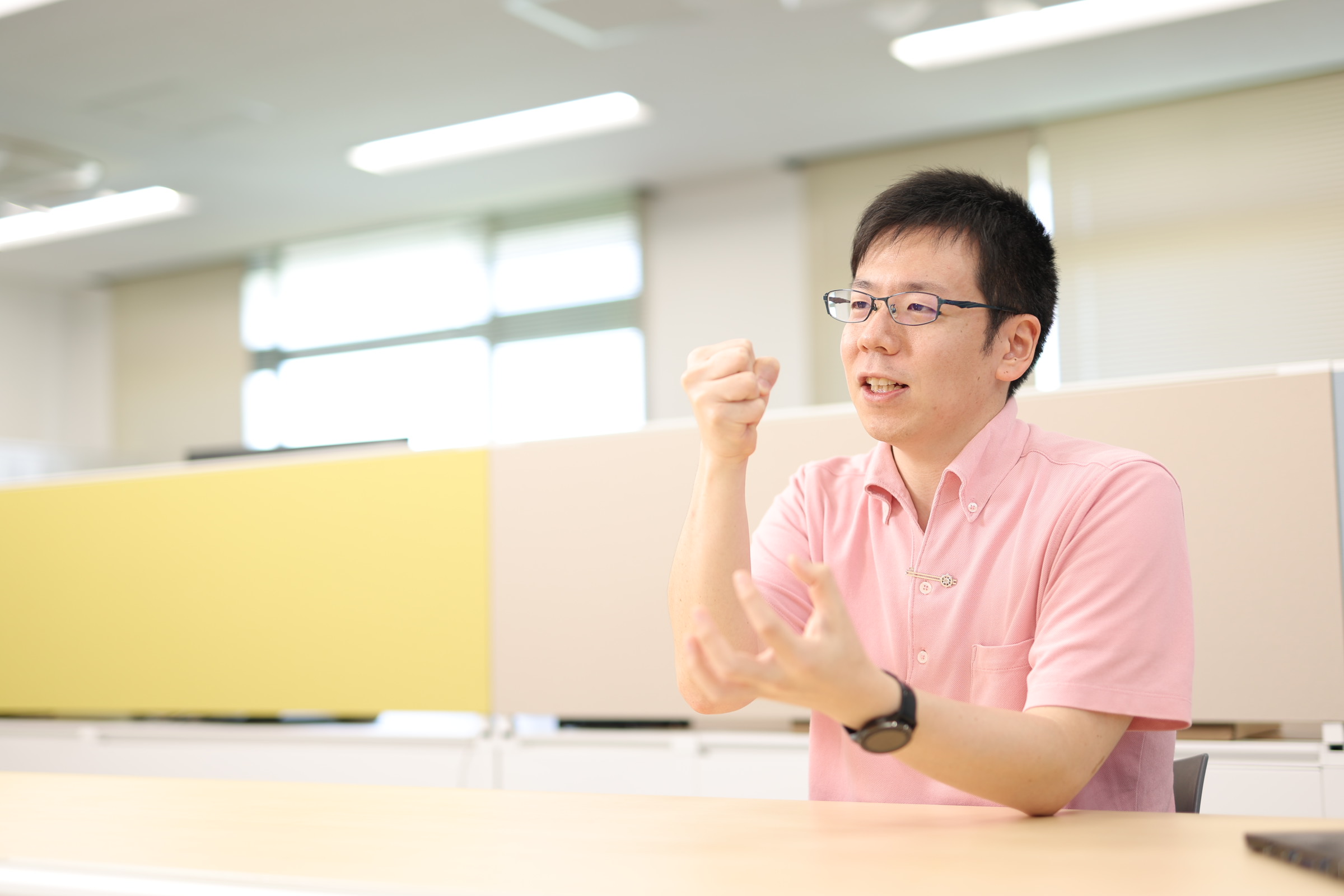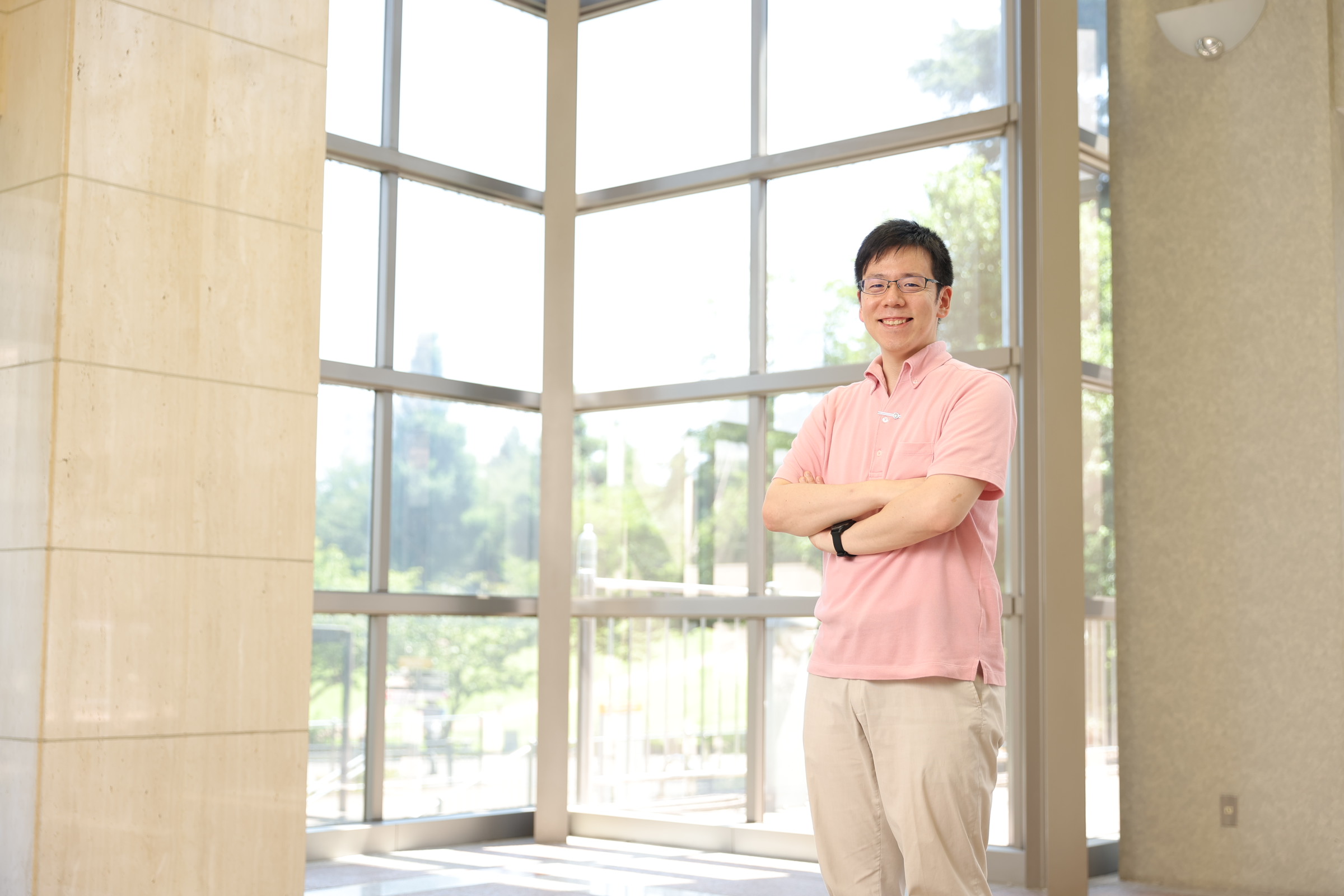This may have already been understood, but what is the Center of Data Science and Artificial Intelligence?
Dr. Yanagisawa has been involved since the establishment of the Center of Data Science and Artificial Intelligence. Can you tell us a little about the time when it was established?
The Center of Data Science and Artificial Intelligence was officially launched in December 2022, but there was a long preparation period before that. The class itself started from the 4th quarter in December 2019, with students from all faculties, including those who had never studied programming, learning mechanisms, from the basics of programming to data science and artificial intelligence (AI) methods, and actually using them. It was a time when data science and AI were already gaining attention, so even though the class was not advertised enough, about 100 people attended the lectures and 60-70 people attended the exercises. Now, it has increased to 2 or 3 times, and the name recognition is getting higher and higher.

What did it mean to be established in the form of a Center?
Up until then, data science and AI classes were held at each school, but I think there is a goal of bringing them together and expanding the Institute-Wide Education more broadly. In addition, the class I talked about earlier was handled as a subject offered by the School of Computing until last year, but if so, it will eventually end up stuck in the School. It is also important that each school operates on an equal footing by standing as an Institute-Wide organization independent of the School. Furthermore, a remote course delivery service to the Thailand Advanced Institute of Science and Technology (TAIST), a Thai university, is already being conducted, but I think it is necessary to create an organization that spans the “Institute-Wide” in order to expand the scope of “Institute-Wide” to outside schools, including overseas.
What happens when data science and AI are combined?
If we break down the word data science, it is the science to data. I believe that the foundation is to find something new based on data and to do something. Artificial intelligence, or AI, is being talked about in parallel, but today’s AI is only possible if there is data, so I feel that it is natural that data science comes first and then AI, and this Center is also in the word order.
There is a keyword “wide-area specialized type”, but what does “specialized” mean even though it is “wide-area”? The words “wide-area” and “specialized” feel like a conflict.
The word “wide-area specialized type” was invented by the Director of the Center, Professor Miyake. As the basic subjects to information, for example, there are “Information Literacy I” and “Information Literacy II” courses for the 1st year of the Bachelor’s program. It is the class taken by almost everyone in the 1st year of the Bachelor’s program. However, this is literally something that learns literacy, so even if it is a part that becomes the foundation, it does not mean that you can use DS & AI alone. It is a “wide area” but not a “specialty”. Even if you only know the basics, it is not easy to apply it as your own power. The level we are aiming for is not there, but after the 2nd year of the Bachelor’s program or after the enhancement of the level of knowledge and skills in post-graduate education. At the same time as honing their expertise, I hope that students with such “specialized” abilities will be born “widely” from the Institute-Wide, who will be able to master DS & AI used to find new things and advance discussions. That is why it is a wide-area specialized type.
Another keyword is the word “Institute-Wide”.
Speaking of AI, I think that the School of Computing will be remembered first, but it is narrow only to educate students in that field. At present, the School of Computing has a capacity of just over 90 students, less than 1/10 of the capacity of the university as a whole, so even if education is conducted for this, DS & AI as a whole will not be sufficiently promoted. Instead, I think it is necessary to have more people who can make full use of DS & AI in various fields, and people who can understand each other when they meet people in other fields. In that regard, I think it is extremely important to expand it to the Institute-Wide.
Student days, when Dr. Yanagisawa was hesitant about balancing research and employment, dragging his passion for chemistry with him.
What is your own specialized field of study? What made you want to do that?
I specialize in the field of bioinformatics, in which we use information technology to solve various problems in life science and find unexplained parts, or in chemoinformatics, in which we use information technology to improve the efficiency of “drug discovery”, which designs drugs for diseases, etc. I am not actually a person who makes drugs, but I am researching the tools to do so, to make the program more efficient and faster. In fact, I prefer simulation, and DS & AI uses it for how to interpret the calculation results. I am using it as a “tool”.
So, did you have the research field called bioinformatics and chemoinformatics since you entered the Tokyo Institute of Technology?
The field itself was. But I did not know at all. In the first place, entering the Department of Computer Science was also a second option. Originally, I had good chemistry grades, and I liked it, but I was scared of an experimental accident. For example, if a chemical is heated and chemically reacted, what to do if a boiling thing jumps? It is scary. I cannot make a living from this. So, when I thought about what my second favorite thing was, it was a computer. That is why I was taking a class in the Department of Computer Science while having an interest in chemistry in my heart. There was a class called “Biological Data Analysis” in the 3rd year undergraduate classes and this was exactly the class of bioinformatics, and this was my encounter with this research field. However, I just wonder; there is an information x chemistry lab in the Chemistry Department, and if I had known that when I was in high school, I would have joined the Chemistry Department, and my life might not be what it is today.
Now you remain in the university as a faculty member, but what do you think you would have done if you did not remain at the university?
In fact, I was full of intention to get a job until around the fall of my Master’s 1st year. I was doing research using machine learning only when I was in my 4th year of undergraduate school, and I wanted to get a job at a company in the DS & AI field. However, as I investigated it, I found that if I joined a company, the idea of using simple methods to increase explanatory rather than using advanced machine learning methods was strong, and I thought this was not interesting. So, I told my supervisor that I would go on to higher education at the beginning of December of the 1st year of the Master’s degree.


Where you can make it easy, make it easy and create a new future.
The purpose of DS & AI is to foster “Co-creative Experts”. Why is it necessary for the world in the future?
Our “Co-creative Experts” consist of 3 pillars: “Making full use of DS & AI”, “Interacting with DS & AI”, and “Teaching DS & AI”. Recently, the number of people who can use tools that incorporate DS & AI technology is increasing, but I feel that the number of people who can understand and master the contents thereof is not increasing so much. The first important point is not to be used as a tool, but to develop human resources who “make full use of” the tool. However, it is still a conventional university education alone. That is not the only goal we are aiming for. The key point is the development of human resources that can “interact” with diverse people through DS & AI technology. I want people who can communicate what they want to do and what their purpose is, using DS & AI as a common language, even if they are from different fields, and I think there is a demand for such people.
It will lead to “teaching” that it will be possible to communicate with people who do not know DS & AI by expanding this “communication”. If school teachers only teach, there is a limit to raise human resources that can make full use of DS & AI. Rather, if you raise people who can “teach”, it will spread many times faster. I think that if there are only 1 or 2 people in each company who can “teach”, the understanding of data science and AI of many companies will deepen at once.
The Tokyo Institute of Technology is proud to be one of the top universities in the field of science and technology, and it is also our responsibility to produce people who can be trusted only because they graduated from the Tokyo Institute of Technology and not to make people who will be considered that although such people graduated from the Tokyo Institute of Technology, they are not enough to be trusted.
How do you think data science and AI will work for the future of Japan?
There is no need to limit it to Japan, but I believe that DS & AI technology should and will make things easier where humans can make things easier. It is good to leave the flow work and routine work more and more. Instead, I think we need people who do more new and creative things. In addition, I think it will be a world where people who can use DS & AI as an aid to do creative things, in other words, people who can create new activities by “using” rather than “being used” will be active. It would be interesting if we could collaborate with such human beings and AI to create something inspired by what AI has come up with.
Students preparing for examinations do not narrow their horizons! Students should be challenging!
Finally, please give a message to current students and those who are about to take the exam.
Data science and AI are now being used in all fields, so I would like students preparing for examinations to avoid narrowing their field of view. As I mentioned earlier, it is premature to immediately recall the School of Computing because it is data science and because it is AI. I would like you to be someone who can think about the field that you are really interested in, develop your expertise in that field, and then get the idea that you can do better by introducing data science to that field. In addition, I want students, not just the Tokyo Institute of Technology students, who have already decided on their specialized fields, to always have a spirit of challenge that jumps into new things. I am in charge of the exercises, but after every class, some students asked me “I don’t know here” or “I don’t know this” for 20-30 minutes. The way the future spreads should be completely different depending on whether students are hungry or not. I think it is very difficult to learn and master new things by adding to your own specialty. But you should be interested in a lot of things and try it in practice. I hope you do not forget this movement. Even if it is hard at that time, I think it is good if you cherish the excitement that it is a little fun, and you feel like you have learned something.

Off-record Talk
Really, I wonder what would have happened if I was not really scared? Immediately after I entered the school was not in the chemistry field but in the information field, and when I took the course, the teacher in charge of the chemistry experiment had a chemical burn. I really thought, “It was good to come to the Department of Computer Science”. On the other hand, although I entered the Department of Computer Science, there are people who have been doing programming since junior high school, and I thought that we who started programming from a university like me could not beat them. That is why I spent my school days thinking that I had to do a combination of “information × something”, but I never thought that it would spread like this. Inscrutable are the ways of heaven, fortune is unpredictable and changeable. We do not know what is going to happen.
